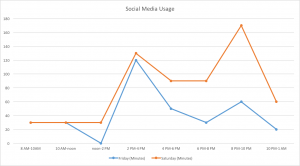Growing up I have always been fascinated by the business world and specifically the free market economical concept. I would often times trade specific items during lunch in elementary school, and try to sell sports equipment online in middle school. As I matured into high school, I began to have entrepreneurial endeavors. I was not old enough to have my own job, or official business, but I was old enough to do some unofficial business. I saved up money in 9th grade, and bought a power washer to begin a power washing business. My simple business plan consisted of having my dad drive me around in his truck with the power washer in the back. I formulated flyers, that I stuck in everyone’s mailboxes in mine and surrounding neighborhoods. I also sent out mass text messages to neighbors offering my service. This method was widely successful. After a few years of doing this, my business expanded, and I was washing a driveway just about every day. Who knew I would have been using media to expand a brand in my high school days. Running this miniature mock business combined with a love for exploring has inspired me to declare International Business as my major.
After doing some research on media branding and social media efficiency in the International Business world, I discovered that social media is essential in the business world, regardless of the size or expansion of a business. This site was useful in my discoveries: http://smallbusiness.chron.com/role-social-media-international-branding-68363.html
Businesses around the globe in today’s age can communicate with potential customers with the click of a mouse or the tap of a finger via the internet and social media. Platforms such as Instagram, Google, and LinkedIn allow business to expand their brands in ways never known before. They can cross all sorts of cultural barriers with these mediums. Culture is much less evident on the internet and through media. Language barriers can also be bridged. Technology often allows words to be automatically translated, which in turn widens the scope of a potential social media campaign for a business. In terms of small business, they often times begin on a domestic level. This allows the business model to mature and grow before it takes on the tenure of an International plan. Social Media trends and tendencies are located, and the business has a more well rounded plan of how to tackle their target market.
Overall, social media can be used for a vast array of reasons by a wide spread of people. This ranges from aspiring kids looking to make money, all the way to International corporations looking for profit. This fact will only accelerate as the world modernizes and relies more and more on media to stimulate economies.

